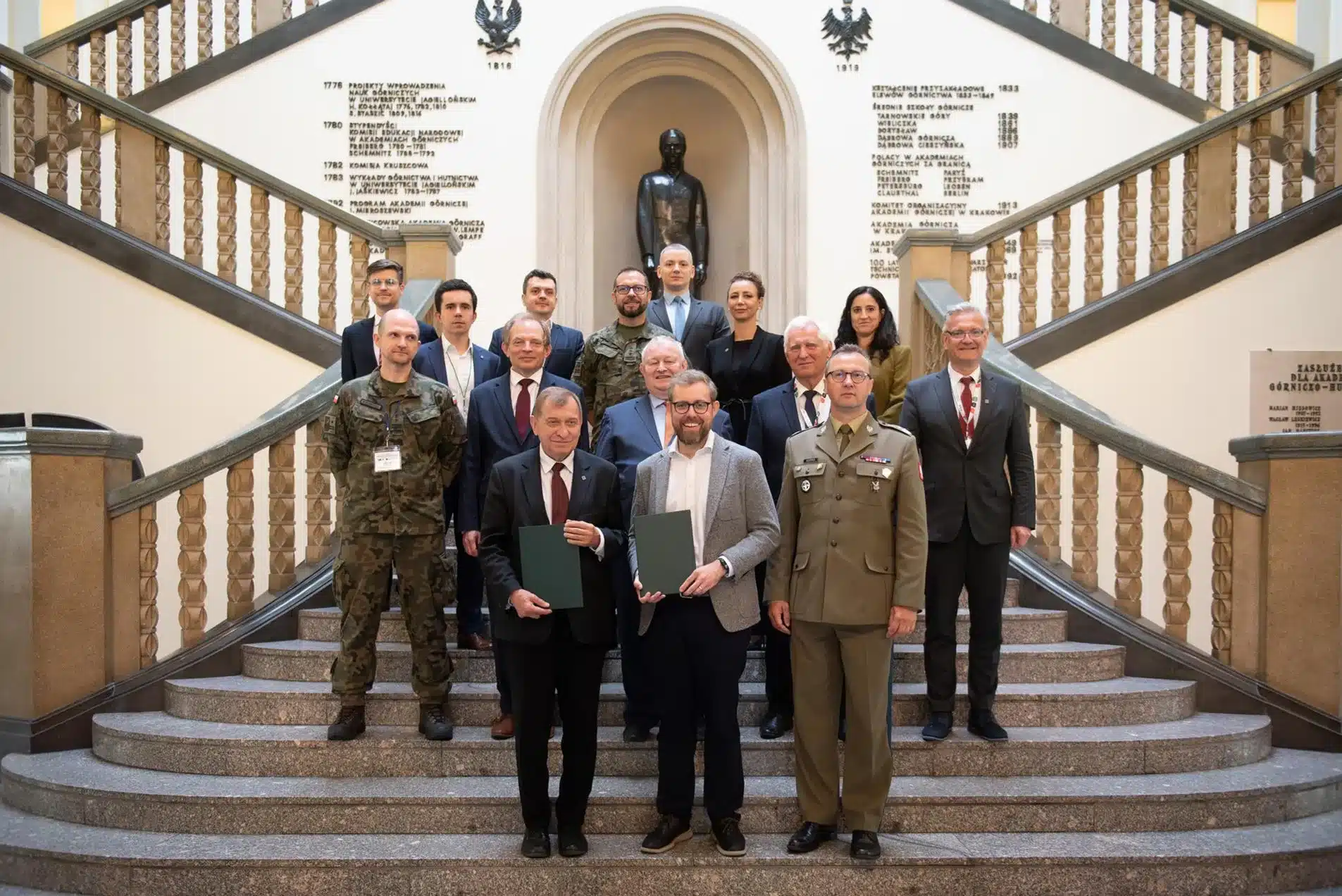At the AGH University of Science and Technology in Krakow, the NATO-Ukraine Defense Innovators Forum took place. The event was attended by key representatives of the North Atlantic Alliance. The summit gathered nearly 400 guests from 17 countries, including stakeholders from the defense and military technology sectors, as well as representatives from over 100 startups.
The event was organized by NATO, the Defense Innovation Unit (DIU) from the USA, and Ukraine’s government Defense Technology Development Cluster “Brave1”. The Polish Ministry of National Defense, in cooperation with the AGH University of Science and Technology in Krakow, hosted the event on the Polish side.
The forum provided an opportunity for NATO leaders to meet with stakeholders from Ukraine, Poland, and several other countries, who are actively involved in practical defense activities, including the development and deployment of unmanned aerial systems (UAS). The participants included entrepreneurs, investors, startup founders, academics, and decision-makers who discussed the use of unmanned technologies and support for Ukraine and other regions.
During the NATO-Ukraine Defense Innovators Forum, participants addressed numerous complex issues regarding the use of drones in Ukraine. Discussions focused on the challenges faced by Ukraine in the rapid development, production, and utilization of UAS. The event at AGH included panel discussions, a UAS hackathon, and a series of workshops for startups. It was an opportunity to discuss real operational challenges, strengthen supply chain cooperation, and develop effective pathways for implementing modern technologies in conflict zones.
“Bringing all the right partners together to address key needs is a model of constructive cooperation on current and future operational challenges,” said David van Weel, NATO Assistant Secretary General for Emerging Security Challenges. “The forum brought our Ukrainian partners and allies closer together to help Ukraine today and strengthen allied forces tomorrow,” he added.
Nataliia Kushnerska, COO of “Brave1,” explained:
“We believe Ukraine is a focal point for future defense technology innovation. Ukrainian developers are already presenting solutions that are changing contemporary perspectives on combat strategies and tactics. We are confident that Ukrainian experience, combined with allied technologies and knowledge, has the potential to form the technological foundation for a safer Europe.”
Participants at the Forum engaged in plenary sessions and debates with representatives from NATO’s innovation unit, the Ukrainian Ministry of Defense and Digital Transformation, and the Polish Ministry of National Defense. Bilateral discussions aimed at understanding the current challenges affecting the drone technology community.
The event also included training sessions and workshops organized by the Defense Innovation Accelerator for the North Atlantic (DIANA).
Hackathon – 48 hours to develop drone software
In parallel with the Forum, a hackathon was held where teams from eight countries (Canada, Ukraine, the Netherlands, Norway, Poland, the United Kingdom, Estonia, and the United States) designed automated visual guidance systems for UAS. The solutions focused primarily on object detection and recognition.
“This event fostered important international and inter-organizational cooperation in support of Ukraine,” said Colonel Glenn McCartan of the US Marine Corps, head of the DIU at the US European Command. “Our goal is to deliver solutions in hours and days, not months and years. This hackathon demonstrated that when the alliance unites around a common cause and shares resources and knowledge, solutions can be delivered quickly and effectively.”
Thanks to generous support from the Defense Innovation Unit and the National Security Innovation Network, hackathon winners received prizes totaling $100,000. Thirteen teams were judged by an international jury based on criteria including innovation. The winning team, Sensorama Lab/KEF Robotics, comprised of designers from Ukraine and Norway, received $50,000 for their solution, which provided automatic object identification capabilities with limited data.
Sensorama Lab/KEF Robotics was not the only team to develop valuable solutions during the competition. Other prize-winning teams included codequest ($15,000) and AI Autonomix ($10,000). Five additional teams, including a student team from AGH in Krakow, received honorable mentions and $5,000 each.
AGH – NATO DIANA Agreement
During the Forum, the AGH University of Science and Technology in Krakow signed an agreement with the Defense Innovation Accelerator for the North Atlantic (DIANA). The signatories were Thomas McSorley, NATO DIANA General Counsel, and Professor Jerzy Lis, Rector of AGH.
The signing ceremony was attended by representatives from the Ministry of National Defense, including General Marcin Górka, Director of the Innovation Department and Poland’s representative on the DIANA Board of Directors; Izabela Albrycht, AGH Rector’s Plenipotentiary for NATO DIANA, and a member of NATO’s Advisory Group on Emerging and Disruptive Technologies (2020–2022); and AGH authorities.
The Krakow Technology Park, which jointly runs the Polish branch of the NATO Defense Innovation Accelerator – Krakow DIANA Accelerator with AGH, was represented by Bartosz Józefowski, Plenipotentiary for Dual-Use Technologies.
Thomas McSorley emphasized that the agreement with AGH recognizes the potential of the Krakow DIANA Accelerator, whose establishment was announced in March this year. McSorley highlighted the potential of the Krakow center in implementing solutions critical to current security challenges. The innovations developed in the university’s environment, coupled with AGH’s research and laboratory facilities and the business acceleration provided by KTP, are expected to yield tangible benefits for alliance and regional security.
Professor Jerzy Lis, Rector of AGH, noted that the agreement strengthens the university’s position not only on the international stage but also as a Polish institution capable of delivering key defense sector solutions. The agreement marks the start of enthusiastic and committed work by the Polish branch of the NATO Defense Innovation Accelerator – Krakow DIANA Accelerator, with a sense of distinction and obligation to the entire alliance.
